Wasn't there a Silpheed remake on the PS2?
Silpheed Review Rewind
|
|
See PixlBit's Review Policies

On 06/13/2016 at 08:00 AM by Jamie Alston Feel the need for Silpheed. |

Hands down one of the best shooters on the Sega CD
When Game Arts released Silpheed on the Sega CD in 1993, the game was frequently compared to Star Fox; the latter usually winning over critics more than the former. Being released within 6 months of Star Fox and featuring a similar visual theme of polygon graphics, Silpheed was sometimes written off as a mere knock-off of Nintendo’s successful three-dimensional shooter. A somewhat misguided conclusion considering that Silpheed was originally released on the PC platform in 1986, pre-dating Star Fox by seven years. It was also criticized for being too simplistic with its 2D shooter mechanics against the pseudo 3D background. But a deeper look into the gameplay of Silpheed (and some honest hindsight) reveals a game that stands on its own and delivers a fairly unique experience rarely had in home console gaming at that time.
The game takes place in the year 3076. The leader of a terrorist group called “Zakalite” has hijacked the Grayzon System-- a central photon computer system stationed on Earth. With it, he was able to order an unmanned space armada to attack the colony planets within his reach. In response to the threat, the Galaxy Union has sent a fleet of newly developed SA-77 Silpheed ships to travel 64 light years to Earth, destroy Zakalite’s army, and restore order in the galaxy.
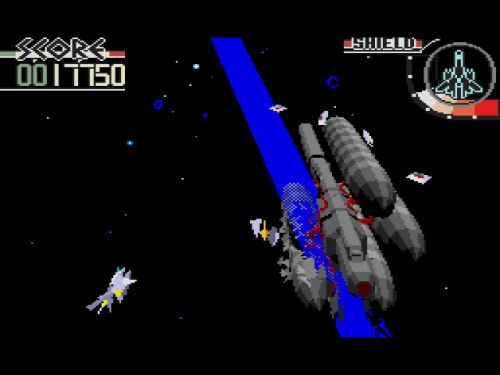
What Silpheed excelled at from the start was creating an engrossing, dynamic experience without stretching the idea too thin. It’s essentially an on-rails 2D shooter with polygonal objects populating the background. Admittedly, rail shooters can be a bit gimmicky and lacking in execution. And while Silpheed doesn’t completely break out of this mold, it still involves you enough that the rails aspect of it is engrossing enough to feel genuine and just flashy fluff. Some enemies have seemingly unpredictable flight patterns, which add to the difficulty of the game. This is mostly true with the smaller enemies that zip around your ship at high speeds. It can be a bit frustrating if you aren’t accustomed to the “depth” of the screen as you move vertically higher. But with some time patience, the average player will get the hang of it.
From stage 2 onward, you can customize your weapon configuration based on the available choices at the moment. For your primary weapons, you must arm the left and right sides of your ship. The you start out with the standard normal twin-shooting Forward Beam. But eventually your choices will include the Wide Beam, Phalanx Beam, and the Auto-Aiming Beam. Aesthetically, there’s nothing particularly spectacular about your primary weapons. They’re basically the same Forward Beam shot except they behave differently according to their intended function. That being said, the weapon selection works quite well in terms of practicality since you can mix and match them to your preference.
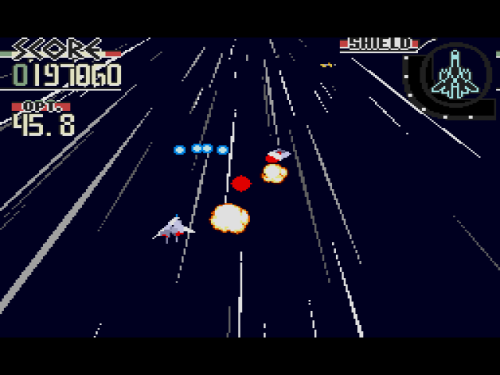
Additionally, you have small selection of optional weapons available as your progress further into the game. You'll have your choice of the Graviton Bomb, E.M. Defense System, Photon Torpedo, or Anti-Matter Bomb-- most of them fairly useful depending on the situation. However, you can only select one per stage. While ammo for these weapons are initially limited, you can add to your stock by scoring enough points in the current stage. Also, the ammo stock of unused optional weapons will continue to increase between stages. This works out very well for those who prefer to take a more strategic approach to the use of their weapons.
In a refreshing deviation from most shooters, your ship is equipped with surprisingly durable shields. You can take up to 6 hits before your defenses are depleted. And even then, you can still take a few additional hits, taking damage to your weapons and engine systems. Then-- and only then-- are you officially toast after that. It’s a welcome gameplay mechanic because there are constant swarms of enemies and bullets that even skilled players are likely to run into. Some stages require a fair amount of your concentration to successfully maneuver through enemy bombardment. Especially in these situations is it good not have the added pressure of not being able to sustain a few hits along the way. The trade-off is that there are no checkpoints in the game.
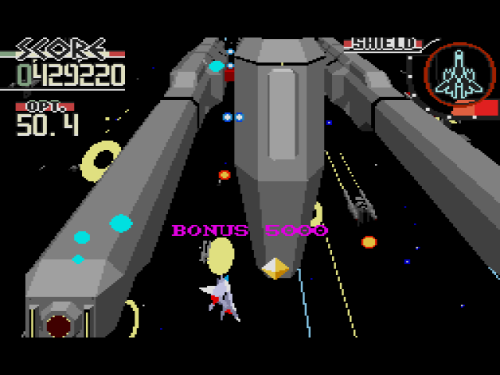
If you die, you must start from the beginning of the current stage. Thankfully, there are floating capsules that carry shield repairs orbs that you can pick up. Depending on which ones you get, the orbs will replenish some or all of your ship's hit points. Alternatively, a portion of your shields will automatically recharge after completing each level. Other power-ups include invincibility, ammo for optional weapons, and smart bombs that clear the screen of enemies on impact. The controls are easy and much uncomplicated to use. You only need one button to shoot the primary weapons, and another button to shoot the secondary ones. Your Silpheed craft is very nimble and can outmaneuver almost anything on screen when in capable hands. So while it’s definitely a challenging game, it’s at least fair and leaves you with the feeling that winning is within your grasp if you try hard enough.
Thematically, Silpheed was huge in scale on an unprecedented level. From the first stage to the final showdown, you'll witness epic battles between your side and the enemy’s happening in the background. Lasers are flying everywhere, space stations are getting blown to polygonal bits, and you'll be swooping in and out of colossal enemy fortresses, many of which you can’t defeat with your own weapons. There are also scripted events that you’ll need to react to. At times you’ll need to dodge some fairly sizable laser blasts fired from enemy armadas or dodge the remains of a giant asteroid that got blasted to kingdom come. Battlefield conditions in nearly every stage are constantly changing, requiring to pay attention and adjust accordingly. Best of all, action doesn’t compromise the game’s silky smooth frame-rate as far as I could tell.
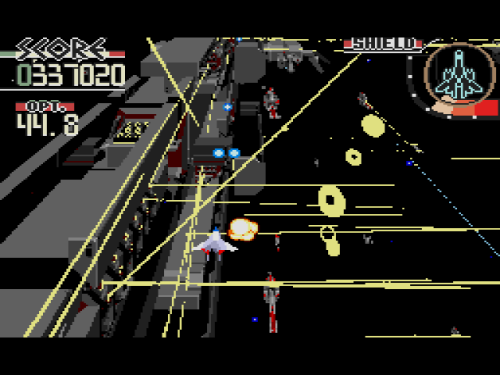
Also noteworthy is that you have a support squadron audibly fighting alongside you. Although you don’t really see your squadron on-screen in most of the stages, there’s plenty of radio chatter to convey the idea that your comrades are actively participating in the battle. I found this to be a refreshing contrast to the often-used (but less probable) idea that you’re the only pilot with the skills\guts\whatever to oppose an enemy that otherwise hilariously outguns you. It fit perfectly with the action and adds to the ambiance in the game. These details made the game feel a little more grounded in a reality that at least seemed plausible, giant lasers notwithstanding.
The sound and music is the other shining point of this fine shooter. The tunes are very fitting for its genre of game. It's mostly comprised of a futuristic rock\funk soundtrack and perfectly complements the action happening around you. My personal favorite is in stage 4 when you’re flying through a constantly morphing enemy fortress. The voice work in the game is clear and audible, mostly. There are few lines I can never quite make sense of, but it’s nothing that compromises the overall quality of the game. And though the delivery of certain lines from your teammates are a little over the top at times, it adds to the game’s charm in its own special way.
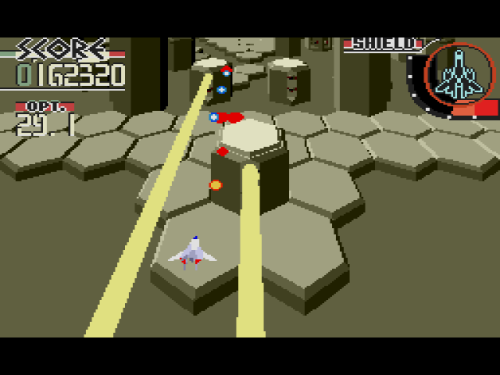
The end, I think Game Arts put together wonderful work of art. Silpheed is a game that ended up being exactly what it needed to be. It didn’t try to be a full-motion video interactive game, nor was it an underpowered generic 2D shooter with CD music thrown in there to compensate for it. The polygon graphics were perfect for what this game was trying to do. The scale and atmosphere made for a great in-game narrative. And best of all, it’s simply fun to play. More than that, Silpheed also helped to prove that the Sega CD could be more than just a novelty hardware add-on. If you own this system and enjoy a challenging (but fair) shooter, this one deserves your attention.









Comments